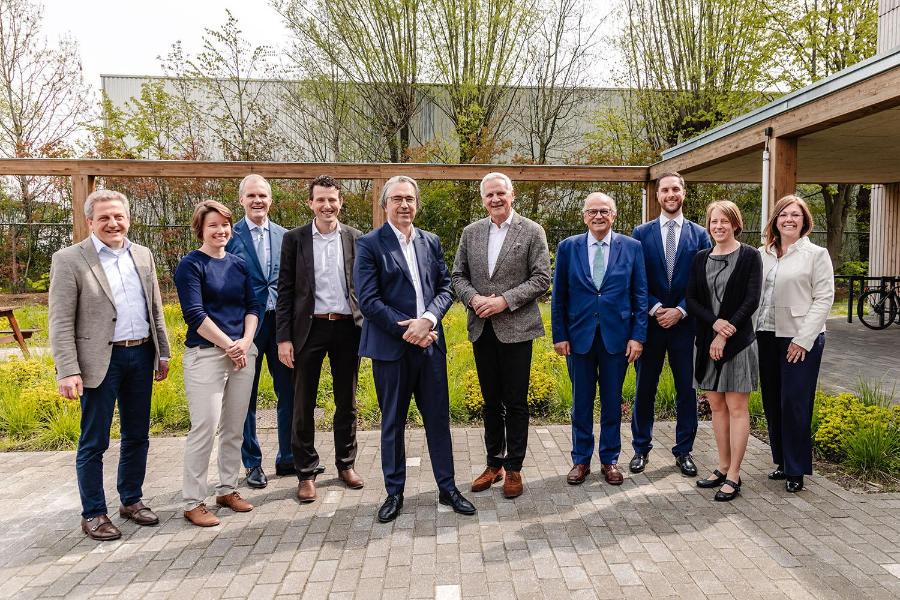
- Aquafin and the EIB have signed an agreement for a €200 million loan. This is the 12th loan that the EIB has granted to Aquafin since 1994.
- The financing will be used for investments that will increase the percentage of wastewater that is treated in the coming years.
- The investments are also expected to make Aquafin's infrastructure even more energy-efficient.
The European Investment Bank (EIB) and wastewater treatment company Aquafin are continuing to build on their long-standing working relationship by entering into a financing contract worth €200 million. This is the 12th loan agreement that the parties have concluded since they started working together in 1994. To date, the EIB has provided more than €2 billion to fund the expansion and improvement of water treatment in Flanders.
The money will be used by Aquafin to support 150 optimisation projects that contribute to climate change mitigation (taking action to limit climate change) and climate adaptation (taking action to adjust to the current effects of climate change). A total of €81.7 million will be invested in 41 projects that focus on the separation of stormwater in order to cope with the effects of more intense precipitation and long periods of drought. This is because stormwater is best kept where it lands if possible, where it can be infiltrated into the soil or stored in buffers for reuse. A significant portion of the financing will also go to projects in areas that include energy savings and the installation of solar parks for generating power.
“The EIB became Aquafin's first financial backer in 1994. Since then, we have been able to count on the EIB for almost half of our long-term loans, or about €2 billion,” said Aquafin CEO Jan Goossens. “This funding shows that we will continue to be able to count on them following the implementation of the new collaborative agreement with the Flemish region. That's why Aquafin considers the EIB to be more than just an investor. It is also a genuine partner for clean watercourses in Flanders, both today and in the future.”
EIB Vice-President Kris Peeters added: “The EIB has invested for decades in improving water management in Belgium, and this has had a huge impact on the day-to-day lives of everyone in the country. Moreover, Aquafin has always been an extremely important partner in Flanders, and it has worked with the EIB for decades. In the coming years, water — and clean water in particular — will become increasingly important to society and the economy, including in the context of climate change. I'm therefore extremely proud that the European Investment Bank has been able to play such a key role in this.”
Just like the previous loans, this funding will also have a positive impact on the quality of surface waters in Flanders, which has already improved significantly since the EIB's first loan to Aquafin back in 1994. In the early 1990s, just 26% of wastewater in Flanders was treated, but that figure had risen increased to 86% by 2022. To a large extent, this increase was made possible by the financing provided by the EIB. Over the years, the EIB has contributed to the construction of 311 sewage treatment plants and 113 pumping stations, and also to the completion of 1 565 water pipeline projects with a total pipeline length of over 10 000 km, including more than 130 projects in which stormwater and wastewater were kept separate.
As this also means that significantly less stormwater and wastewater runs into the North Sea without being treated, this funding also contributes to the Clean Oceans Initiative. This initiative is aimed at cleaning up the seas and oceans so that they are able to fulfil their role as a counterweight to climate change.
Background information:
In 2020, the Bank provided nearly €1.3 billion in loans to Belgian projects in various sectors, including healthcare, water management, education and small and medium-sized enterprises (SMEs). Since 2012, the EIB has made almost €2 billion available for water projects in Belgium in collaboration with parties including SWDE, TMVW, HydroBru, SPGE and Aquafin.
Aquafin constructs and manages the infrastructure that treats the domestic wastewater of some 5 million people in Flanders, on behalf of the Flemish region. This includes carrying out projects in which the Flemish region takes over investments from municipalities in order to ease their financial burden. When carrying out projects, the company makes every effort to create space for water and facilitate stormwater infiltration and buffering. To date, Aquafin has delivered projects worth a total of €4.5 billion for the Flemish region, and it currently has projects worth a further €1.9 billion in its portfolio.